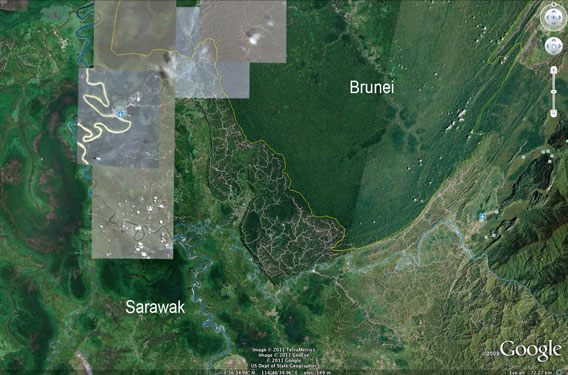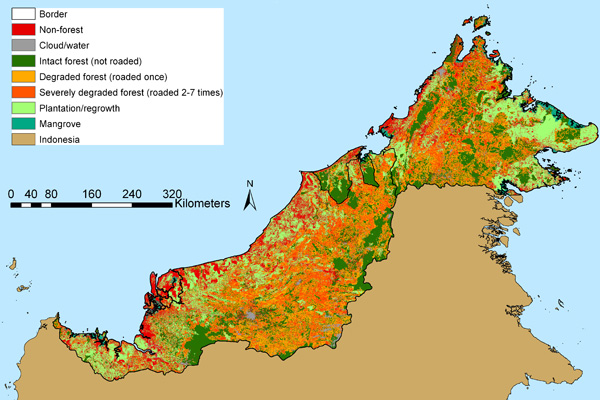
Logging roads and damaged forest in Sarawak compared with the healthy forest of Brunei. In 2011, former chief minister Taib Mahmud famously claimed that 70 percent of Sarawak’s forests were ‘intact’. He was quickly refuted, leading to embarrassment for Sarawak’s forestry department. Photo courtesy of Google Earth.
In a surprising statement, Sarawak’s new chief minister called the state’s logging sector ‘corrupt’.
Speaking to a group of forestry company executives last week, Chief Minister Tan Sri Adenan Satem condemned business-as-usual practices in the logging sector and demanded that the state’s six largest companies sign “integrity pledges”, reports Malaysian state media.
Adenan called out the companies — KTS, Rimbunan Hijau, Samling, Shin Yang, Ta Ann and WTK — and told executives “don’t mess with me”, according to The Star.
Reporter Yu Ji writes:
-
He described the present state of corruption as “very bad, a reflection of what enforcement officers have not been doing”.
“Some, of course not all, pretend they don’t know. The reason is very simple; either they are stupid, cowards or corrupt,” Adenan said to a stunned audience, comprising state Cabinet members, civil servants and some of Sarawak’s richest individuals.
Adenan said Sarawakians must not tolerate corruption anymore because millions had been lost revenue and the state gained a bad reputation internationally because of “this robbery which is carried out in broad daylight.”
The statement is significant given long-standing allegations of collusion between logging companies and Sarawak’s highest-ranking officials. For example, civil society groups have accused former chief Minister Taib Mahmud of acquiring billions of dollars in assets during his 33-year-reign. Those assets are the product of corrupt practices, according to the groups.

Bulldozer at a conventional logging site in Malaysian Borneo
Adenan’s remarks were immediately welcomed by the Bruno Manser Fund, a group that campaigns on behalf of Sarawak’s forests and indigenous people.
“Today is a day of celebration for Sarawak and Malaysia”, Lukas Straumann, Bruno Manser Fund’s executive director, said in a statement. “These are the clearest words ever we have heard from a leading Malaysian government minister to combat corruption as a root cause of deforestation and under-development.”
“We commend Chief Minister Adenan Satem for his courageous stance and important leadership in this question. The international community and civil society are ready to assist Sarawak in the badly-needed reforms not only of the forestry practices but also its governance and institutions in a wider sense.”

Forest cover status in Sarawak, Sabah, and Brunei as of 2009.Bryan et al 2013.
86 percent of Sarawak’s lowland forests were logged or cleared between 1973 and 2010, according to a study published in July. Only a quarter of the state’s forests were “intact” as of 2010.
The situation is set to worsen due to plans to convert up to a million hectares of forest to oil palm plantations by 2020. Much of that is classified as native customary rights (NCR) land, meaning that it has traditionally been used by indigenous people. An added threat to Sarawak’s forests and forest people comes in the form of a series of large-scale hydroelectric projects, that will flood rainforests, villages, and traditional hunting grounds.














